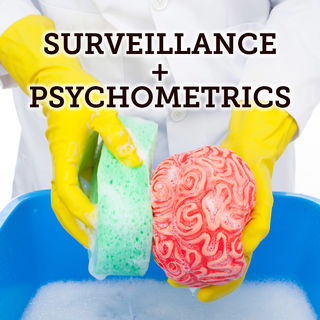Openness
The Psychometrics of Decentralization
Cambridge Analytica's persuasion technologies can be used by forces of good.
Posted June 14, 2018

While the 20th century drove the centralization of resources and capital, both in terms of the kinetic energy of human endeavor and the potential energy of money, we have now, at the commencement of the 21st century, begun a massive societal shift toward decentralization. So what exactly is decentralization? Simply put, it is the process of taking power away from the central, authoritative group that drives an eco-system, and giving it back to its constituents.
We have seen only the first few gusts before the hurricane. When a startup can raise $35 million in 30 seconds, with no equity dilution, it’s a game changer. And it’s only the beginning. We’ll see the impact of decentralization and blockchains in every sector of industry, in every walk of life. But the deepest and most pervasive shift will happen in the arena of decentralized identity, which also deals with the subject of psychometrics.
Let’s drill a bit deeper into this topic.
How to Digitally Brainwash the World
Let’s talk about psychometrics, the dark arts of artificial intelligence that Cambridge Analytica used to, well, do what they did in the last election. First, if the word psychometrics is new to you, get used to it. These are tools that measure personality traits. Think of it as Meyers Briggs on steroids. According to this latest and greatest slicing and dicing of the human psyche, there are five dimensions of personality: openness to experience, conscientiousness, extraversion, agreeableness and neuroticism. The mnemonic is cleverly set to the word OCEAN. To see how OCEAN can work in a marketing context, let's look at each dimension briefly:
Openness to experience. People who are open to experience display a lot of creativity and inquisitiveness. But if you score too high on this measure, you could lack focus. Score low, and you're probably close-minded.
Conscientiousness. People who score high on this dimension tend to be disciplined, organized and goal-focused. Score too high and it’s an indicator that you’re a bit obstinate and or maybe even obsessive, but if you lack conscientiousness entirely, you may be unreliable.
Extroversion. This category has to do with being outgoing, energetic and generally positive. If you over do it, you're probably a bit of a drama queen. If you have a low score, you're probably a bit too shy, or maybe even an incel.
Agreeableness. Agreeable people are empathetic, supportive and congenial. But score too high on this one, and you're probably a tad naïve; too low, and you're overly competitive.
Neuroticism. This is one you probably don’t want to score so high on. Neurotic people tend to jump quickly to negative emotions, like anger, anxiety and ruminative thinking.
This is how you use this information for interactive marketing: If a travel company is trying to sell vacations in Costa Rica, the online ad could change depending on the psychometric type. If you have someone open to experience, then show an image of someone screaming in joy as they are using a zip line over the jungle canopy. If it’s someone with a high degree of extroversion, then show an image of meeting interesting local people at special group dinners. And this stuff works. Research has shown that people are 50% more likely to buy the products if they see an ad targeted at their particular type. Traditional blanket advertising is dead.
Liberating the Digital Serf
Now here’s the thing: If decentralization is really about empowering people, then using psychometrics to brainwash people and make them act in a way that is not in their own interest… can’t possibly be a positive thing. Decentralization should fight manipulation, because an artificially intelligent brainwasher is simply the new boss, just like the old boss except infinitely more cunning. You know, as in “bow down to your robot overlord.”
What’s happening is that we are now transitioning from a digital feudal system, similar to when vassals owned vast amounts of land in the Middle Ages. Serfs worked the land to create value but most of the value was appropriated by the vassal. Today, the new asset class is data—where value is created by all of us but captured entirely by digital vassals and sovereigns (governments, social media companies, search engines, banks, etc.). To recapture our data rights, we need to stage an identity revolution.
And to anyone who says to me, “It’s so complicated, can’t I just let Google or Facebook manage my identity for me?” I’ll simply say what I’d say to a serf in the Middle Ages, who complains that owning land is too complicated. “Listen, trust me on this… you’re gonna LOVE owning your own land.”
However, experts say that it’s impossible to prohibit psychological targeting, especially as a tool of political propaganda. But let’s think about it before we swallow that hook, line, and sinker. Is it possible to invent a technology that could circumvent psychological targeting of propaganda? Michal Kosinski, a psychologist and assistant professor of organizational behavior at Stanford Graduate School of Business, who refused to work with Cambridge Analytica and raised concerns about that work with Cambridge University, says, “Psychometrics are a bit like fire. You can use fire to both warm your house and burn it down. You can’t ban fire, and you can’t stop some people from committing arson. What you need are firefighters and fire-safety equipment.”
Politicians are like hammers, and everything looks like a nail to them, so all they want to do is enact policies and punish people who cross that line. But are regulations the best way to go?
Perhaps the equivalent of fire safety equipment could be an intelligent assistant app, like a Siri for the forces of good, that knows your psychometric type, and whenever something looked manipulative in an ad or in your Facebook feed, it could check to see the reputation of the poster and warn you. Is that poster really a Russian bot? Does this company have a good or bad reputation for truth-in-advertising, or its 21st century equivalent… ethics-in-advertising. If something like this were possible, then that intelligent agent could slowly teach you how not to get brainwashed, which is a really good skill to have in this day and age. Perhaps what we need is a Big Sister, that counteracts Big Brother, to increase common sense?
Also, here’s one more thought… why make a distinction between targetable propaganda and surveillance capitalism? Why is it that using such techniques to support major brands is okay, but once you start doing it in an election, you’ve crossed the line?
An Experiment on this Blog
Finally, just for fun… let’s talk about how we could use psychometrics to insure faster adoption of decentralized technologies. For example, people who score high on Openness will be obviously be more open to open technologies than most, but the theory tells you that they can be persuaded by the potential of blockchains to “unleash your creativity”. These will be the early adopters, but the user experience has to be somewhat rich and exciting. Conscientious types can be persuaded by offering that blockchain technology is immutable, so they never need to worry about missing something and that life will be “audit-free” in the future. Extroverted people can be reached by showing the passion of the blockchain movement. And Agreeable people are easy to sell.
Actually, I ran an experiment with the last article I posted, about how Burning Man was similar to blockchains, to see if posting an article with some Burning Man flavor, targeted to blockchain Openness readers, might be effective as clickbait to drive viral propagation. It was a departure from my normal mode of writing. Well, in three days, it had more reads than an equivalent blockchain article got in three months. This stuff works!




